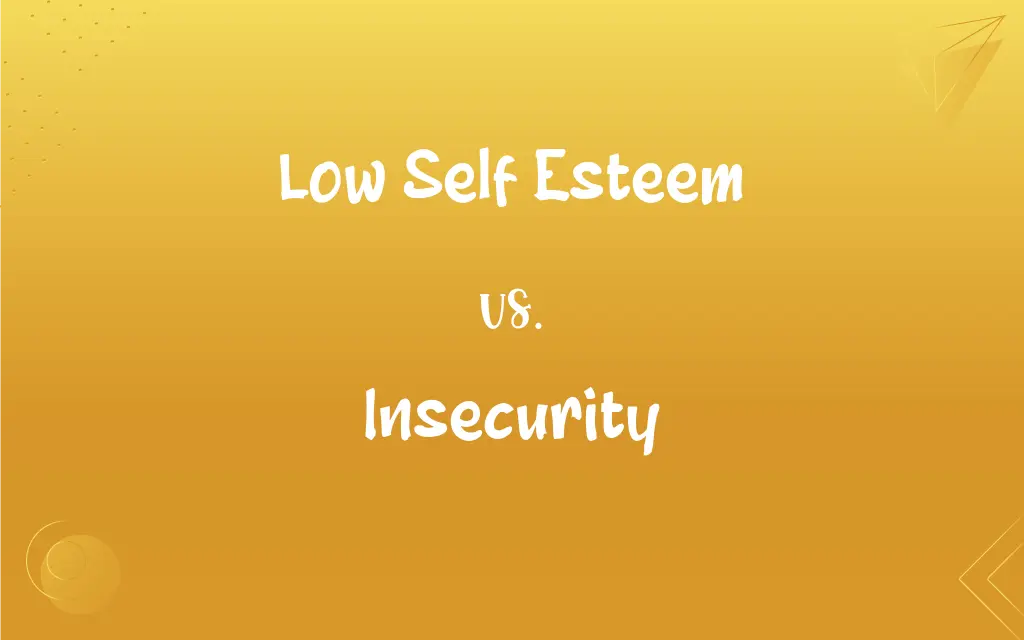Low Self Esteem vs. Insecurity: What's the Difference?
Edited by Aimie Carlson || By Janet White || Published on December 20, 2023
Low self-esteem is a chronic feeling of inadequacy and self-doubt, while insecurity is a feeling of uncertainty or anxiety about oneself.

Key Differences
Low self-esteem is an enduring sense of unworthiness and a lack of confidence in one's abilities or value. It's a deep-rooted perception of oneself that often affects overall life satisfaction. Insecurity, on the other hand, refers to feelings of unease or anxiety about oneself, which may be situational or specific to a context, such as in relationships or particular skills.
People with low self-esteem consistently view themselves negatively, doubting their worth irrespective of their achievements or abilities. This perspective is less about specific situations and more about a general sense of self. In contrast, insecurity often arises in response to certain situations, triggering feelings of not being good enough in specific aspects of life, such as social interactions or job performance.
Low self-esteem is a broader, more pervasive issue that can influence one's overall worldview, often leading to a persistent sense of failure or inadequacy. Insecurities, while they can be intense, are usually more focused, relating to specific fears or anxieties like fear of rejection or not meeting certain standards.
The roots of low self-esteem can often be traced back to early life experiences and long-standing beliefs about oneself. It can manifest in various life areas, impacting relationships, career choices, and personal growth. Insecurities, however, can develop at any point in life and may be influenced by external factors like societal pressures or personal experiences.
Treatment and coping strategies for low self-esteem often involve long-term work on self-perception and self-worth. Insecurity, while it may also benefit from similar strategies, often requires addressing specific fears or anxieties, possibly through targeted actions or cognitive-behavioral techniques.
ADVERTISEMENT
Comparison Chart
Definition
Chronic feelings of inadequacy and doubt
Situational anxiety and uncertainty
Source
Deep-rooted self-perception
Specific fears or contexts
Impact on Life
Broad and pervasive
Specific and situational
Development
Often rooted in early life experiences
Can develop at any life stage
Treatment/Coping Strategy
Long-term self-perception work
Addressing specific fears or anxieties
ADVERTISEMENT
Low Self Esteem and Insecurity Definitions
Low Self Esteem
A lack of confidence in one's own value and abilities.
Her low self-esteem often stopped her from voicing her opinions in meetings.
Insecurity
Feeling unsure or anxious about oneself.
His insecurity about public speaking made him nervous during presentations.
Low Self Esteem
A deep-seated feeling of not being good enough.
His low self-esteem kept him from applying for the job he really wanted.
Insecurity
Fear of not meeting expectations or standards.
His insecurity about failing made him over-prepare for tests.
Low Self Esteem
Chronic self-doubt and negative self-perception.
She couldn't accept compliments, a clear sign of her low self-esteem.
Insecurity
Unease about one's place or stability in a relationship or job.
Insecurity about her job security kept her constantly stressed.
Low Self Esteem
Persistent doubt in one's worth or abilities.
Despite her success, she felt she didn't deserve praise due to her low self-esteem.
Insecurity
Anxiety or uncertainty in social or personal situations.
Insecurity about her appearance often made her hesitant to attend social events.
Low Self Esteem
An enduring sense of personal inadequacy.
Low self-esteem made him feel unworthy of his partner's love.
Insecurity
Lack of confidence in specific abilities or outcomes.
She felt insecurity about her skills, doubting her competence in the new role.
Insecurity
Not sure or certain; doubtful
Unemployed and facing an insecure future.
Insecurity
Inadequately guarded or protected; unsafe
A shortage of military police made the air base insecure.
Insecurity
Not firm or fixed; unsteady
An insecure foothold.
Insecurity
Lacking stability; troubled
An insecure relationship.
Insecurity
Lacking self-confidence; plagued by anxiety
Had always felt insecure at parties.
Insecurity
A lack of security; uncertainty.
Insecurity
A lack of confidence in oneself; self-doubt.
Insecurity
The state of being subject to danger; vulnerability.
Insecurity
The condition or quality of being insecure; lack of safety; danger; hazard; as, the insecurity of a building liable to fire; insecurity of a debt.
Insecurity
The state of feeling insecure; uncertainty; lack of confidence.
With what insecurity of truth we ascribe effects . . . unto arbitrary calculations.
A time of insecurity, when interests of all sorts become objects of speculation.
Insecurity
The state of being subject to danger or injury
Insecurity
The anxiety you experience when you feel vulnerable and insecure
FAQs
Is low self-esteem common?
Yes, many people experience it at various points in their lives.
What causes low self-esteem?
It often stems from negative early life experiences or ongoing critical self-assessment.
How can someone improve their self-esteem?
Through therapy, positive self-talk, and challenging negative beliefs.
Can low self-esteem affect relationships?
Yes, it can lead to dependency or avoidance in relationships.
How does insecurity differ from low self-esteem?
Insecurity is situational, while low self-esteem is a broader, more ingrained issue.
Can insecurity be overcome?
Yes, through targeted strategies like exposure therapy or skill development.
What is low self-esteem?
It's a persistent feeling of inadequacy and self-doubt.
Are there physical symptoms of low self-esteem?
Yes, like slouched posture, nervous habits, or avoiding eye contact.
How does low self-esteem manifest in daily life?
It can appear as reluctance to take risks, social withdrawal, or self-neglect.
Can insecurity affect job performance?
Yes, it can lead to underperformance or excessive stress.
Is therapy effective for low self-esteem?
Yes, therapy can be very beneficial.
Is it normal to feel insecure at times?
Yes, everyone experiences some level of insecurity.
How can someone support a partner with low self-esteem?
By offering reassurance, understanding, and encouraging professional help.
Can lifestyle changes help with self-esteem and insecurity?
Yes, like regular exercise, healthy diet, and positive social interactions.
What is insecurity?
It's a feeling of uncertainty or anxiety about oneself in specific situations.
Do low self-esteem and insecurity influence each other?
Yes, they can be interrelated, with one exacerbating the other.
What are common signs of insecurity?
Such as excessive worry about what others think or fear of failure.
Can insecurity lead to relationship issues?
Yes, it can cause jealousy, trust issues, or miscommunication.
Does social media affect self-esteem and insecurity?
Yes, it can exacerbate both by creating unrealistic standards.
Can childhood experiences impact adult self-esteem?
Absolutely, early experiences significantly shape self-perception.
About Author
Written by
Janet WhiteJanet White has been an esteemed writer and blogger for Difference Wiki. Holding a Master's degree in Science and Medical Journalism from the prestigious Boston University, she has consistently demonstrated her expertise and passion for her field. When she's not immersed in her work, Janet relishes her time exercising, delving into a good book, and cherishing moments with friends and family.
Edited by
Aimie CarlsonAimie Carlson, holding a master's degree in English literature, is a fervent English language enthusiast. She lends her writing talents to Difference Wiki, a prominent website that specializes in comparisons, offering readers insightful analyses that both captivate and inform.






































































